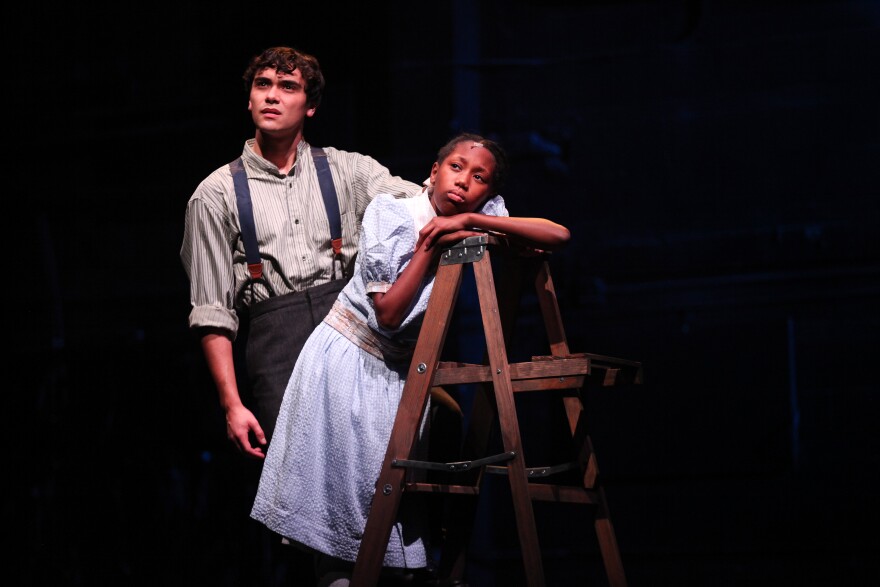"Our Town" by Thornton Wilder at Syracuse Stage asks the question "Do any human beings ever realize life while they live it?" Set in the fictional town of Grovers Corners, New Hampshire at the turn of the century, the play incorporates elements of central New York.
"Our Town" calls for no curtain, no props and little scenery. At Syracuse Stage, a large tree stands in the middle of the stage — the theater's infrastructure is exposed showing the black wall and lighting equipment.
"There's some scenery for those who think they have to have scenery," quips the character of the stage manager as the cast establishes the homes of the Gibbs and Webb families with two chairs and a table. Later two step ladders will serve as bedrooms where George and Emily look out their windows.
Unlike other productions of the piece, Syracuse Stage incorporates a water element into the set — drawing from the history of Syracuse.
"You can't talk about the history of the city without talking about water," Director Bob Hupp said. "Whether it's Onondaga Lake or the Erie Canal, the history of the city is tied to water."
The play depicts life in Grovers Corners from 1901 to 1913 with the first act showing daily life, the second love and marriage and the third death and eternity. The character of the Stage Manager, portrayed by Jim True-Frost, breaks the fourth wall to talk to the audience. Most of the cast is in period clothing representing the early 1900s. True-Frost dons a black Syracuse Stage sweatshirt and khakis.

"The stage manager speaks of the town as if he's very much a part of the town," True-Frost said. "He knows it in and out, knows all the people there and yet he's also kind of another other worldly presence. He's able to stop and start the action and later in the play you see that he's got a kind of a direct line to the afterlife."
True-Frost said in the rehearsal process the production's stage manager taped out the town showing where walls, buildings and rooms are located so actors knew how to move throughout the space. Portraying the role of the Stage Manager, True-Frost does the same for the audience.
"Walk them through and say, 'Here's where everything is,'" True-Frost said. "'The railway station is over there and the store is here.' Let the audience's imagination do the job of creating the world."
Diego Echeverria De Cordova, a Syracuse University junior, makes his professional debut as George Gibbs. The audience follows George as a high school boy who struggles with algebra and loves baseball to his marriage to his sweetheart and later success as a farmer.

"There's a lot of love and hope in this character," Echeverria De Cordova said. "Even in the worst of times, there is a boyish sort of sincerity and simpleness."
The actors pantomime everything like prepping meals in their kitchens, stringing beans in their garden, throwing the newspaper onto neighborhood porches and the milkman walking his cow throughout town as he delivers milk to each home.
Hupp said the actors worked with a movement consultant to help bring these daily routines to life. The performance also utilizes a soundscape.
"You might not see an actor throw a newspaper onto somebody's front porch," Hupp said. "But, you will hear the newspaper land on the front porch. That oral sort of the support for the work that our actors are creating makes for a very rich experience in the theater."
While the play is set at the turn of the 20th century, many themes and experiences feel universal. Echeverria De Cordova said he notices this especially following the COVID-19 pandemic - saying he hopes people can enjoy the small moments like having a cup of coffee as much as the large moments.
"I think it's time for us to start realizing that maybe we have to realize that the life we're living, we're very lucky to have it," Echeverria De Cordova said. "We're very lucky to have a conversation with a friend of yours, or hug with your mother, or your father or your sister. It's those little things that I think make it so universal. It could be Grover Corners. It could be Syracuse."
"Our Town" is on stage through April 16.








